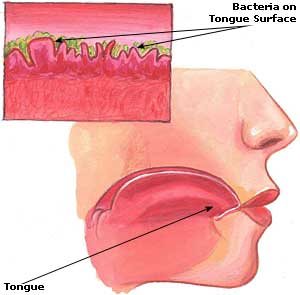By Arthur Kezian
We have all experienced the horror of bad breath, or in medical terms, a case of halitosis. For some, bad breath or halitosis can be a chronic and constant problem. Poor dental hygiene, underlying medical diseases and even specific foods that you eat can all contribute to this condition. The stress and embarrassment of having foul breath can have a negative impact on your lifestyle. Dr. Kezian can provide some insight into the causes of halitosis, lifestyle changes, and treatment options available to assist you in combating this irksome and often debilitating problem.
What Causes Halitosis or Bad Breath?
 The most common cause of halitosis (bad breath) is poor dental hygiene. Foods, especially carbohydrates that you consume, get broken down in your mouth and attacked by bacteria. The Bacteria that live inside your mouth digest the sugars that you consume and develop acids as a result. The leftover food debris, acids, and saliva come together and form plaque on the surfaces of your teeth. If these are not regularly cleared away by good dental hygiene habits, bacteria will continue to grow; the excess bacteria can lead to foul odors. Additionally, some foods that you eat such as garlic or onions, once absorbed into your bloodstream, pass onto your lungs and get exhaled with your breath. These in combination with inadequate dental hygiene can exaggerate the problem.
The most common cause of halitosis (bad breath) is poor dental hygiene. Foods, especially carbohydrates that you consume, get broken down in your mouth and attacked by bacteria. The Bacteria that live inside your mouth digest the sugars that you consume and develop acids as a result. The leftover food debris, acids, and saliva come together and form plaque on the surfaces of your teeth. If these are not regularly cleared away by good dental hygiene habits, bacteria will continue to grow; the excess bacteria can lead to foul odors. Additionally, some foods that you eat such as garlic or onions, once absorbed into your bloodstream, pass onto your lungs and get exhaled with your breath. These in combination with inadequate dental hygiene can exaggerate the problem.
 Persistent halitosis may be a sign of other oral health problems such as chronic gum disease. Excessive plaque build-up on the teeth results in inflammation and irritation of the gums. Early gum disease is known as gingivitis. If this condition remains untreated, permanent damage to the gums and jawbone can occur. Xerostomia, or dry mouth, is a medical disease that results in too little production of saliva. Saliva is important because it not only helps you wash away food remnants but also neutralizes the acids made by bacteria. Without saliva, excessive plaque can build-up resulting in chronic bad breath. Some medical diseases such as respiratory infections and autoimmune diseases, or even medications can result in xerostomia.
Persistent halitosis may be a sign of other oral health problems such as chronic gum disease. Excessive plaque build-up on the teeth results in inflammation and irritation of the gums. Early gum disease is known as gingivitis. If this condition remains untreated, permanent damage to the gums and jawbone can occur. Xerostomia, or dry mouth, is a medical disease that results in too little production of saliva. Saliva is important because it not only helps you wash away food remnants but also neutralizes the acids made by bacteria. Without saliva, excessive plaque can build-up resulting in chronic bad breath. Some medical diseases such as respiratory infections and autoimmune diseases, or even medications can result in xerostomia.
How to Tackle the Problem of Bad Breath?
A first step is to practice good dental hygiene – this includes frequent brushing, flossing, and rinsing with mouthwash. If this does not eliminate bad breath, you may have tooth decay or gum disease that needs to be treated. Dr. Kezian and his staff can meet with you to come up with a treatment plan that includes fixing your cavities and gum disease. If these simple dental treatments don’t work, a more comprehensive medical exam may be necessary to find the root cause of the problem and lead to your halitosis treatment. Don’t hesitate to make an appointment with Dr. Kezian, halitosis treatment is only a call away.
Dr. Arthur A. Kezian DDS 443 N. Larchmont Blvd Los Angeles, CA 90004 (323) 467-2777
